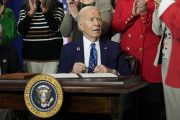
When running for president in 2007-2008, then-Senator Barack Obama (D-Ill.) promised his administration would be the most transparent and open in history. As president, Obama certainly made history, but in an opposite way from which he promised.
Instead of being the most open and transparent, the Obama administration set a record for rejecting the most Freedom of Information Act (FOIA) requests. Under the law, individuals can ask for copies of government records, and are then to receive them, with certain exceptions. Those exceptions include areas involving national security, and material that would violate personal privacy, or expose business secrets. In some cases, some government decision-making is confidential, and also exempt from FOIA requests.
In its final year in office, the Obama administration broke its own record for failing to fully comply with FOIA requests. In sheer numbers, the administration either redacted materials or in most cases simply rejected the requests almost 600,000 times, which was 77 percent of the time. Most of the time, the Obama administration responded by saying they just could not find the material requested. But when a lawsuit was filed in response to failure to provide some e-mails sent to former Secretary of State Hillary Clinton, the State Department suddenly found 90,000 documents they argued they had previously overlooked.
Among the biggest malefactors in failing to respond to the requests as the law stipulates was, not surprisingly, the Federal Bureau of Investigation (FBI). The FBI claimed that they could not find the requested documents 39 percent of the time. (I have found this lack of response from the FBI to be the case in some of my own journalistic inquiries.) The Environmental Protection Agency (EPA) was particularly reticent in turning over requested documents. Its regional offices in New York and New Jersey did not produce requested records 58 percent of the time.
In some cases, agencies under the Obama administration defended in court their refusal to divulge the records. Many news organizations and some “public interest” groups resorted to lawsuits, with many winning their cases. The Associated Press (AP) was awarded $105,546 from the State Department to cover its legal fees after its successful suit to obtain records from Clinton’s tenure as secretary.
In all, the Obama administration spent $36.2 million to fight FOIA requests in court. Eric Holder’s and Janet Lynch’s Justice Department spent $12 million to keep the public from having access to many of its records. Other huge expenditures were made by the Department of Homeland Security and the Department of Defense.
Amazingly, when running for president, Obama made an issue out of the reluctance of the Bush administration to turn over documents under FOIA, stating, “More and more, the real business of our democracy isn’t done in town halls or public meetings or even in the open halls of Congress. Decisions are made in closed-door meetings [such as the meeting between former President Clinton and Attorney General Lynch on the tarmac of an Arizona airport perhaps?], or with the silent stroke of the president’s pen, or because some lobbyist got some congressman to slip his pet project into a bill during the dead of night.”
What did Obama say he intended to do about this? “We have to take the blinders off the White House. The more people know about what’s going on in Washington, and how their tax dollars are being spent, and who’s raising money for who, the less likely it is that major decisions will be hijacked by lobbyists and special interests.”
The Obama administration admitted that it could have done better, saying it incorrectly refused to adequately respond to more than one-third of the requests.
To be fair, much time and money is spent in responding to the FOIA requests. Last year, there were almost 800,000 requests made to over 100 federal departments and agencies. Josh Earnest, who was a spokesmen for the Obama White House, defended the administration’s lack of transparency and openness by attacking Congress. The law was passed in 1960, at which time Congress wrote an exemption for itself into the law, giving Earnest an opportunity to divert attention away from his boss’s failures.
“Congress writes the rules and they write themselves out of being accountable,” Earnest complained. He said Congress should “subject themselves to the same kinds of transparency rules that they insist other government agencies to follow.”
While Earnest makes a valid point concerning Congress, it is at least odd that he would refer to Congress as just another government agency. Under our system of separation of powers, it is the role of Congress to make laws as the legislative branch. Agencies fall under the executive branch, with the role of administering those laws. Individual American citizens are much more likely to have an interest in how a law is being administered against them than they are with how some committee of Congress is conducting business. The Constitution, for example, forbids Congress from passing a bill of attainder, in which they would direct the arrest of an American citizen. Individual American citizens are much more likely to face legal problems due to the actions of a federal bureaucrat than from their congressman. Still, the fact that Congress exempts itself from laws it expects other Americans to follow is a legitimate issue.
Although the Obama administration spent much time and money to keep U.S. citizens from knowing what was going on inside their own government, it also was very harsh in dealing with individuals who disclosed certain secret information, making use of the World War I-era Espionage Act. Using this war-time law, Obama’s government prosecuted what it called “leakers” at double the rate of the previous administration.
Interestingly, Obama did commute the prison sentence of Bradley Manning in the last days of his presidency. Manning, a private in the Army, had leaked certain military information and got caught. After conviction, Manning said he was transitioning to a woman, and even changed his name to Chelsea Manning. When Obama opted to give clemency to Manning, but not Edward Snowden, it raised the question as to what was his motive for the different treatment of the two men. Considering that Obama adopted a rather radical social agenda when it came to the transgender issue, some have speculated that had Bradley not become “Chelsea,” he would not have won the president’s favor.
With Obama now out of office, attention has turned to the new Trump administration, with questions as to what his attitude will be toward FOIA requests. Trump said little about the issue during his 2016 campaign, leading some to note his secretive practices as a private businessman and those of his presidential effort. He required his staffs in both to sign non-disclosure agreements. But, of course, no comparable FOIA laws governed the actions of a private business or even a political campaign.
Others have noted that Trump has kept some journalists out of political rallies and one White House press briefing. In this case, it is more likely that President Trump is acting out of a (legitimate) belief that some liberal reporters are more out to “get” him than that he is trying to be secretive about anything.
Finally, some have argued that Trump’s failure to release his tax returns is predictive of what he will do on the issue of FOIA. But a person’s private tax returns and public business are likewise different matters.
Perhaps Obama’s comments, made in 2007, can sum up the issues involved in government openness and transparency: “I know it’s easy to be cynical about politics in this country. I understand that cynicism. But I’ve always said that when the American people are paying attention — when they’re involved and engaged and informed about what’s going on in their government — then good things happen. I’ve spent my life trying to open up the political process.”
Too bad he stopped doing that when he became president.



